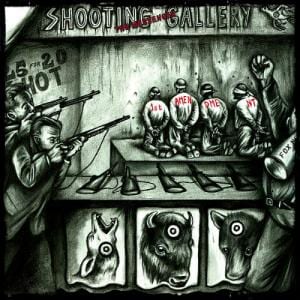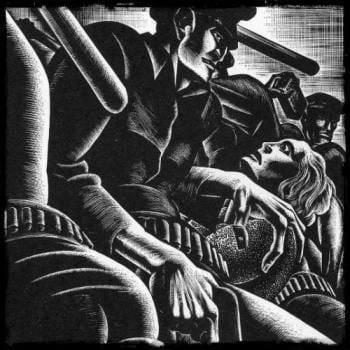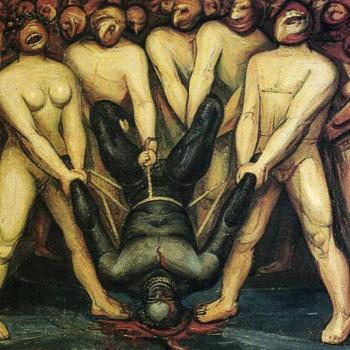Waterboarding is how we baptize terrorists. – Sarah Palin (NRA annual meeting, 2014)

Guns give us a pretty clear and simple way to think about this gross (orange) hairball we’ve just coughed up. In the United States, guns are collocative with a host of other right-wing cultural tropes that have found their way into our political idiom (white supremacy, states rights, limited government, homophobia, biblical fundamentalism, military zeal, homespun rural values and toxic nostalgia, among others).
Did we assume (because the data / numbers / facts told (and tell) us so) that gun owners were / are simply an atavistic remnant of a fading age of Caucasian male celerity, in which the gun, like many an appendage from our earliest species origins, survived only as a useless, slightly maligned encumbrance? Did we assume atavistic meant harmless?
Recent major national studies of gun ownership (the NORC General Social Survey and a detailed survey conducted by Harvard and Northeastern University public health researchers) confirm long-term trends toward a bifurcation of gun ownership that closely tracks the polarization of the political parties in the United States. Because guns are so expressive of deeper national political and cultural currents, the way we think about them greatly matters for the future of political discourse, political opportunity, and public policy in the United States.
1. Demographics
21st-century demographics don’t favor gun owners, who remain predominantly older white males in rural parts of the South and Midwest. In the next 50 years, the nation (if it survives in its present form) will become more urban and less white. The Trump election and the emergence of an explicitly white nationalist political minority does not change this reality. More young people will grow up in an environment where there is no functional need to own a gun and where the idea of owning a gun seems alien. For these reasons, trend lines do not objectively favor gun owners.
Of course, guns are prevalent with young minorities who live in cities, but gun possession among this population is largely associated with gangs and drugs. In other words, gun possession within this urban youth population is an immensely destructive accouterment of youth, not an article of religious faith. Revamping our drug and incarceration policies to keep kids in school and out of jail, and to remove the market incentives for illegal drug trafficking, would likely make a big dent in the percentage of young minorities living in cities who possess firearms.
2. Protection
Notably, the percentage of Americans who say they own a gun for protection has risen precipitously at the same time that crime has fallen dramatically (even with the recent surge of violence in predominantly black urban silos). For this reason, it is difficult to make the argument that the perceived need for “protection” is based in reality, on actual probabilities of meaningful threat. Instead, we must wonder whether the urge to own a gun for personal security rests more on a different, less concrete understanding of what constitutes a threat, and how best to handle that threat, whether it is imagined or real.
Guns give people the fantasy of control, not the reality of control, so to understand the firearms ownership obsession, we need to appreciate what fantasies are at work. For example, there is a significant fear among whites of black youths. But of course we also know that most violence involving young black males is geographically specific, committed against other black males, who more than likely know each other personally. This reality removes any reasonable argument for stand-your-ground laws, concealed-weapons-laws, open-carry-laws, give-everyone-assault-rifles-laws, and let’s-allow-guns-in-schools-parks-churches-and-bars laws.
3. Politics
People in the United States generally don’t question the need for our state governments to license both cars and their drivers. It is self-evident to just about everyone that cars in poor condition, or in the possession of the wrong people, become weapons that menace our safety.
The logic for gun-control laws is virtually identical to the logic for licensing cars and drivers. And so it should not surprise us that one of the biggest obstacles to reasonable gun-control laws, particularly in less densely populated states, is the outsized influence within their governing bodies of white, male, and rural representatives. It is precisely among these populations where one would expect the logic for regulating ownership and use of both firearms and motor vehicles to be almost equally suspect.
The intimidating rhetoric and organizational virtuosity of the National Rifle Association reinforces the rural-white-male bias within state legislatures. The effect has been to give interests favoring extreme gun rights disproportionate power to open the floodgates to gun ownership and to block laws that would enact even the mildest background check or gun safety provisions. Of course the other major source of influence in this debate, when one looks further under the skirts of the NRA, is the firearms industry.
4. Constitution
A well regulated Militia, being necessary to the security of a free State, the right of the people to keep and bear Arms, shall not be infringed.
Okay. Super.
Citizens of other nations generally feel no need to own guns and their rate of gun violence is far lower than it is in the United States. We shouldn’t underestimate how weird and creepy our national obsession with firearms appears to people in other countries around the world. Second Amendment zealots fully appreciate how far they have removed themselves from the global mainstream when it comes to opinions about gun ownership. They just don’t care.
Appealing to an abstract “Constitutional” or “God-given” right to own guns in response to the condemnation of pretty much everyone else in the world really is not useful. Most legal scholars would agree our nearly 230-year-old Constitution, which is one of the oldest in existence, and which has never had a fixed meaning but has always been in instrument of political conflict, is long-past due for an overhaul. The U.S. Constitution was drafted for a nation entirely different from the country in which we now live. As for our right to own guns being God-given, well, let’s wait to see if God ever speaks on this topic (or on any other).
5. Definitions
What is a well regulated militia? What does it mean to say this militia is necessary to the security of a free state? What is the origin and nature of this right of the people to keep and bear arms? What are the scope and limits of infringement?
For that matter, what is the definition of arms? And do we need to continually (but randomly) adjust the definition of the constitutional right to keep and bear arms to whatever lethal production value presents itself to us? In the 21st century, we each can manufacture (untraceable) weapons using 3D printers. Pretty much anyone can buy an assault rifle that on its own would have obliterated the entire Continental Army. We can now weaponize drones. How do we know which of these capacities for extreme lethality falls under the protection of the Second Amendment? How do we decide?
How do we balance this vague and uncertain (because entirely decontextualized) right to keep and bear arms against other rights and freedoms guaranteed by the Constitution? What is the relationship between guns and freedom, anyway?
6. Ontological Fundamentalism
Constitutional fetishists – and certainly Second Amendment gun fetishists – are like other fundamentalists (Biblical and Koranic and Talmudic and otherwise) in the predilection for assigning mystical, unassailable powers to historically arbitrary objects (or people or events). We can deduce evidence for the arbitrary (and so essentially false and manufactured) and misplaced (because essentially dead) reverence for history in the tendency of ontological fundamentalists to assign more literal (and legal) significance to the sacred texts as they become more distant in time. In this sense, the Second Amendment, particularly to the degree it collapses the entire meaning of the Constitution and of the American political experiment into itself, is little more than a scam and a ruse and a blight upon the nation.
7. Human Nature
Guns don’t kill people, people do.
When guns are outlawed, only outlaws will have guns.
Guns are only tools.
For decades, gun rights advocates have parroted these slogans without really feeling any need to justify their claims logically or support them with evidence. Indeed, logic and evidence both clearly indicate that the abstract concept of a “person” is woefully inadequate for capturing the range of psychological circumstances and conditions to which every one of us is subject on a daily basis. At any given moment, even the most rational or disciplined or experienced among us is capable of acting irresponsibly or dangerously — out of rage or despair or incompetence or inattention or indifference.
We are imperfect beings. Put a perfect tool of destruction and mayhem in our hands, and you can well predict the havoc we are capable of unleashing.
8. Freedom
Gun rights advocates in the United States sequester their odd claims under the sheltering canopy of faith and freedom. Gun ownership has become a bizarre, frenzied religion. A cargo cult that worships the smooth barrel of a gun, a false idol, with its prosthetic, prophetic promise that we can blast our way into Heaven. The language of the Second Amendment has itself become fundamentalist literalism, obsessively parsed for divine meanings and prophecies, the authority that justifies itself. To paraphrase Sarah Palin, violence is how we baptize our enemies and confirm our freedom.
However, neither gun ownership nor the Second Amendment can confer, exalt, or secure freedom. Enhanced destructive capabilities do not make us free. Nor can we subsist on parchment freedoms inscribed in the Constitution. Indeed, to make a piece of technology or a piece of sheepskin the enabling condition for our freedom is to trivialize beyond recognition the meaning of freedom, and its importance to our nation.
Freedom is a spiritual condition of awareness, an intellectual endowment of foresight and reflection, a physical gift of health and wholeness, and a social capacity for conversation and communion. We are free when we can trust the spaces and the silences that separate us from our brothers and sisters, an interim that lets us fully see ourselves, and know ourselves, through the reflection in their eyes and in the rise and fall of their breasts.
The gun destroys the interim. The gun takes away our freedom.












